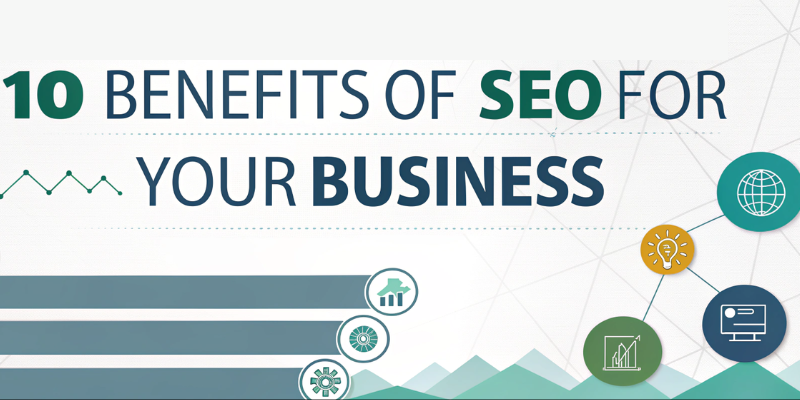1. Introduction
Search Engine Optimization (SEO) is the process of optimizing your website to improve its ranking on search engine results pages (SERPs). In today's highly competitive digital world, SEO is essential for businesses that want to increase online visibility, reach a broader audience, and drive more sales. SEO is not just about using the right keywords; it involves optimizing your website's content, technical structure, and user experience to align with the ranking criteria used by search engines like Google. A well-executed SEO strategy is a long-term investment that helps businesses build an online presence that attracts organic traffic, establishes brand authority, and increases conversions. In this blog, we will explore the top 10 benefits of SEO and explain why your business needs to make it a priority for growth in the digital marketplace.
2. Increased Website Traffic
At its core, SEO is about driving more traffic to your website, which is one of its most significant benefits. By optimizing your website's content for the right keywords and improving its technical aspects, you increase your chances of ranking higher in search engine results, which makes your site more visible to potential customers. The higher you rank, the more organic traffic you attract, which is critical for your business's growth.
Organic traffic is highly valuable because users actively search for your products or services, meaning they are already interested in what you offer. This traffic is more likely to convert into customers and tends to be more consistent over time compared to paid ads. As SEO is a long-term strategy, the results build on each other, meaning your traffic grows as your website's authority increases. The benefits of this steady stream of traffic are compounded, and with the right SEO strategies in place, your website will continue to attract visitors long after the initial optimization.
3. Cost-Effective Marketing Strategy
SEO is one of the most cost-effective strategies compared to traditional marketing and paid advertising methods. While PPC (pay-per-click) advertising requires constant investment, and its effectiveness diminishes when you stop paying for ads, SEO helps you generate organic traffic without recurring costs. Once your website starts ranking well, it doesn't require continuous spending to maintain visibility, unlike paid ads that require constant financial input.
Moreover, SEO's long-term nature makes it an even more cost-effective choice. Although the initial investment may involve costs such as hiring SEO professionals or investing in tools, the results compound over time. With SEO, you are not just paying for a click but investing in long-term value that keeps providing results. As you optimise your website, you'll attract more qualified leads and reduce customer acquisition costs, giving your business a better overall return on investment (ROI).
4. Builds Brand Credibility and Trust
The credibility and trust of your brand are significantly enhanced through effective SEO. When your website appears at the top of search results, it immediately communicates to users that your business is trustworthy and authoritative in your field. Consumers tend to trust search engines like Google to deliver the best and most relevant results, so when your site ranks highly, it signals to potential customers that your brand is reputable.
SEO helps you build this credibility by creating quality content, obtaining backlinks from other authoritative websites, and optimizing for technical aspects like site speed and mobile-friendliness. Earning high-quality backlinks from trusted sources within your industry further enhances your site's trustworthiness. Additionally, having a website that provides a great user experience, with fast load times and easy navigation, also increases the perception of your brand as professional and reliable. Over time, as your website ranks high and delivers quality content, customers associate your business with reliability, fostering a loyal customer base.
5. Improves User Experience (UX)
SEO is more than just keywords and rankings; it's also about improving your website's overall user experience (UX). A well-optimized website isn't just designed to rank well—it's designed to provide a seamless experience for visitors. Google's algorithms increasingly prioritize websites that are relevant to search queries and provide great user experiences. For example, if your site is slow to load or difficult to navigate, users are more likely to leave, increasing your bounce rate and negatively affecting your rankings.
Key aspects of SEO that improve UX include optimizing site speed, ensuring your website is mobile-friendly, and simplifying navigation. Google's mobile-first indexing means websites must be optimized for mobile devices
Don't miss your chance to enroll now.🚀 New Batch Starting Soon!
6. Higher ROI Compared to Traditional Marketing
SEO delivers measurable results, making tracking your return on investment (ROI) easier than traditional marketing strategies like print ads, billboards, or TV commercials. With SEO, you can track key metrics such as traffic, conversions, and leads, which allows you to measure the direct impact of your efforts. In traditional marketing, it's often difficult to track whether a campaign directly leads to sales or if the audience is even seeing your ad.
Additionally, SEO brings in high-quality leads. By optimizing for specific keywords that are relevant to your audience, SEO ensures that the visitors coming to your website are genuinely interested in your products or services. These leads are far more likely to convert, leading to higher ROI. As your SEO efforts continue to improve your rankings and drive more organic traffic, the cost per lead decreases, making SEO one of the most efficient marketing strategies in terms of ROI.
7. Better Local Visibility for Businesses
Local SEO is an essential strategy for improving visibility and attracting nearby customers for businesses that serve a specific geographic area. Local SEO involves optimizing your website and online profiles to rank for location-based search queries. This includes using location-specific keywords, claiming and optimizing your Google My Business profile, and getting local backlinks from other businesses or websites in your community.
Local SEO is crucial for small businesses, brick-and-mortar stores, and service-based industries like restaurants, plumbers, or salons, as it helps them stand out in local search results. For example, a bakery optimizing for "best cupcakes near me" can ensure it shows up in local search results, driving more foot traffic and increasing local orders. By optimizing for local SEO, your business can capture the attention of customers who are already in your area and ready to purchase, improving both your online and offline sales.
8. Competitive Advantage
In an increasingly crowded marketplace, SEO provides a significant competitive advantage. By implementing an effective SEO strategy, you can outrank competitors who aren't optimizing their websites as effectively. SEO allows you to analyze your competitors' strengths and weaknesses, identify opportunities, and optimise your site to outperform them in search rankings.
For example, suppose you find that a competitor ranks well for specific keywords but lacks content quality or user experience. In that case, you can optimize your site with better content and an improved user experience to surpass them. This results in increased visibility, higher trust, and more market share. SEO also helps you capture customers who might otherwise choose a competitor, giving you an edge over businesses not investing in their online presence.
9. Adapts to Evolving Consumer Behavior
As consumer behaviour changes, SEO adapts to meet the evolving needs of your audience. Over the years, search behaviour has shifted from traditional text-based searches to voice and AI-driven queries. To stay ahead of the curve, businesses must optimize their websites for these new technologies.
For example, voice search queries tend to be longer and more conversational. Optimizing your content for long-tail keywords and natural language can help you capture voice search traffic. Additionally, mobile optimisation has become even more crucial as more people use mobile devices to browse the internet. SEO ensures that your website remains relevant by adapting to these changes, meeting the evolving search trends, and keeping your business in tune with your audience's preferences. By staying updated on consumer behaviour trends and adjusting your strategy accordingly, you ensure your business remains visible in an ever-changing digital world.
10. Long-Term Sustainability
Unlike short-term marketing tactics that deliver temporary results, SEO is a long-term strategy that yields sustainable results. Once your website ranks well, it doesn't need constant investment to maintain its position. Your SEO efforts today will continue to pay off for months or even years.
SEO is a compounding strategy. As you consistently optimize your content, improve your website's technical aspects, and build backlinks, your website's authority grows, resulting in higher rankings and more traffic. Regular performance monitoring and content updates ensure that your website remains relevant and competitive, helping you stay visible and continue to attract organic traffic for the long haul. With SEO, your business can achieve lasting growth and maintain a competitive edge in the digital landscape.
11. Learn More About SEO and Digital Marketing
To fully leverage the power of SEO and other digital marketing strategies for your business, invest in an SEO course or a comprehensive Digital Marketing Course. These courses equip you with the practical knowledge and skills to optimize your website, stay on top of SEO trends, and implement effective digital marketing strategies. By gaining hands-on experience in keyword research, content creation, and performance analysis, you can create a tailored SEO strategy that maximizes your business's online visibility. Consider taking a #1 Digital Marketing Coaching course in Jaipur to gain valuable insights and boost your digital marketing skills.
12. Conclusion
In conclusion, SEO is a powerful and cost-effective strategy that can drive more traffic, increase brand credibility, and help your business stay competitive in an increasingly digital world. From building trust with potential customers to ensuring long-term sustainability, SEO offers numerous benefits beyond just ranking on search engines. As consumer behaviour evolves, SEO adapts to meet these changes, ensuring your business stays ahead of the curve. If you want to see significant growth in your business's online presence, investing in SEO is a must. Start optimizing today to unlock your company's full potential in the digital economy.



